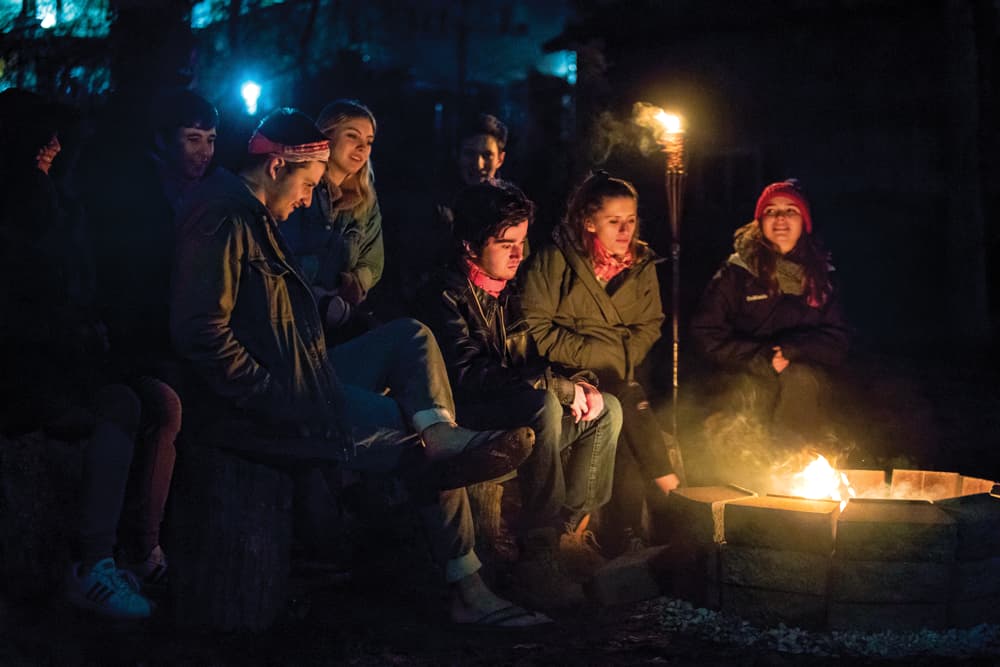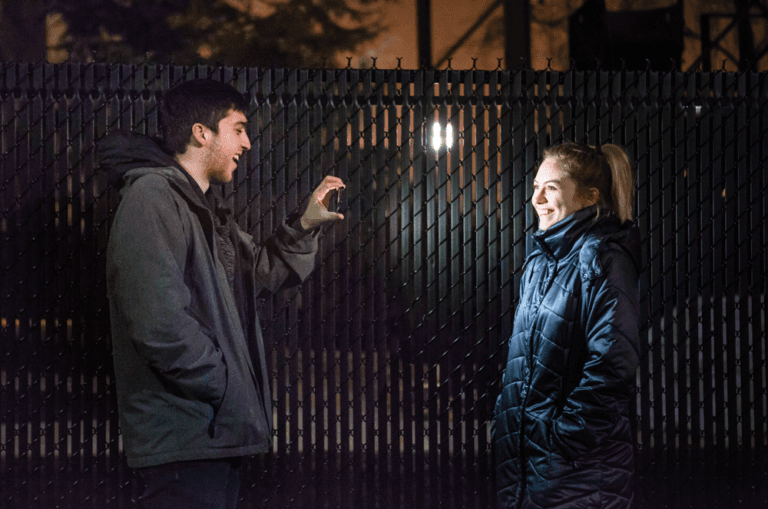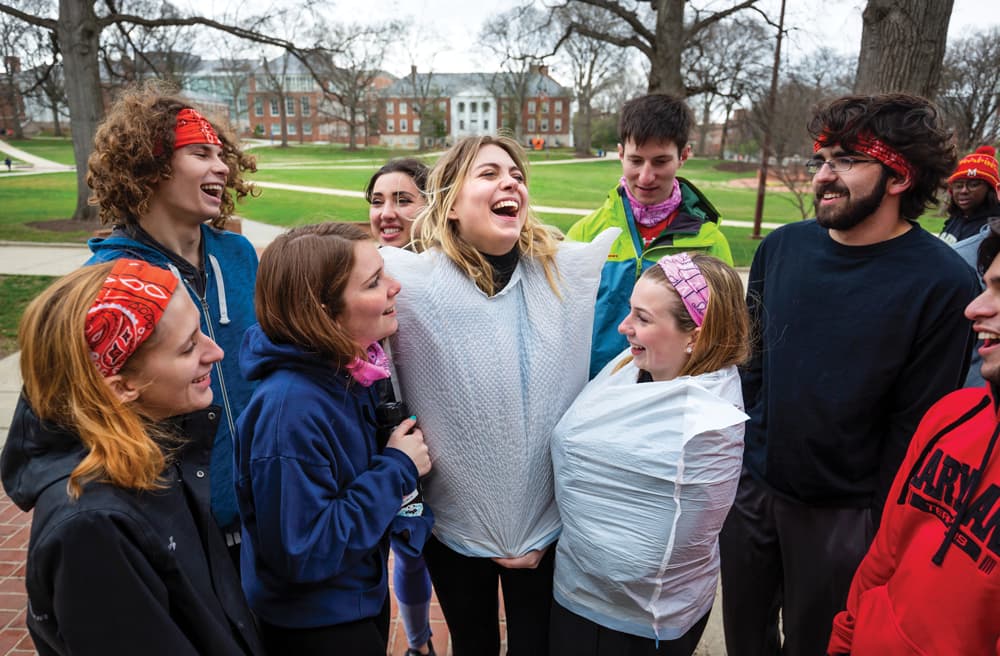Dedicated—and slightly obsessed—Terps created their own version of “Survivor.” Twelve smartphone-shot seasons later, they’ve kept the torch burning, and passed it to “castaway” communities across the country.
by Annie Dankelson | Photos by John T. Consoli and Stephanie S. CordleChris LeCompte ’16, the infamous pot-stirring contestant of “Survivor: Maryland’s” second season, sat before the tribal council facing elimination. Head down, he blurted out why he’d been distracted heading into the vote: His dog died.
His fellow Terp tribe members, gathered around a picnic table bookended by tiki torches near La Plata Beach, couldn’t help but be moved, and LeCompte went on to finish fourth and return for season five: “All-Stars.”
Except: LeCompte’s dog had not died. Sammy wasn’t even sick.
Welcome to the ultra-competitive world of “Survivor: Maryland,” UMD's student-run, smartphone-shot version of the CBS reality show.
Undergraduates with a flair for the dramatic, the strategic and the slightly outrageous have signed up for Maryland’s game since 2012, with around 20 Terps divided each semester into tribes to face off in physical and mental challenges, and vote each other out until a winner emerges for a whopping $100 prize. So it’s exactly the same as the TV reality-show stalwart, except that one lasts 39 days, maroons contestants in remote locations and awards the victor 10,000 times as much.
And while the “real” show is chugging along with 38 seasons since 2000, “Survivor: Maryland” has developed a cult following of its own, with thousands of views on its YouTube episodes, a robust Reddit and Twitter presence, and student versions of host Jeff Probst popping up at colleges across the country.
“Since there are no stakes—very minimal stakes, I guess—it’s all prideful, and it’s all just competitive nature,” says Drew Lerner ’20, the third and current host of “Survivor: Maryland.” “The genuine emotion on the screen is what people connect to.”

When Austin Trupp ’15 first arrived on Maryland’s campus, his La Plata residence hall felt like an island: the home away from home, the shared living spaces and bathroom, and the constant interaction between floormates.
“I just kept thinking,” he says, “that this would be such a good setting to do a version of ‘Survivor.’”
Maybe not every incoming Terp’s first thought, but Trupp is a superfan. He’d seen every episode—which required some catching up, as he was 6 when “Survivor” premiered—and had tested his skills in online versions of the game. He wanted to create the full experience, though, so he broached the idea of a college edition to his friends, joking about who would backstab whom. He eventually convinced them, and after a summer of planning, “Survivor: La Plata Island” began his sophomore year.
“I thought at that point I was just going to do it, like, for one semester,” Trupp says. “I wanted people to have something to remember about college that wasn’t just going out and going to parties, going to their classes.”
That initial season, Trupp filmed only occasionally so the 21 participants could have a souvenir of their experience. But as others saw bandanna-clad Terps constantly playing this elaborate game near La Plata, word got around, and hopeful contestants convinced Trupp to keep “Survivor” going—and to record full-length YouTube episodes.
The cell-phone-shot scenes are choppy. The audio is inconsistent. Generic dorm furniture and freebie college shirts with the sleeves cut off are common sights. But it’s enough.
“A small online community kind of discovered it and would talk about it and write about the episodes,” Lerner says, “and that’s how it kept spreading.”
On top of managing his Honors College course load, chairing the University Student Judiciary’s executive board and being a resident assistant, Trupp ran a one-man show, filming, editing and running challenges and tribal councils. When the now-government analyst graduated with government and politics and business degrees, fellow fanatic Anders Norberg ’18 took over hosting duties. And when Norberg donned his cap and gown, he passed the torch to Lerner

“I think ‘Survivor’ gives a lot of passion to other people,” says Norberg, also a business major. “I’ve had nights where we’re outside in freezing temperatures and rain doing a challenge, and people are yelling and crying.”
That passion—maybe obsession—is contagious. Close to 200 students have played, and beyond Maryland, Trupp estimates that students from 25 colleges across the country have reached out about starting their own “Survivors.” YouTube shows are already in place at Michigan, Ohio State, Emerson, Virginia and more.
“Maryland definitely set the blueprint,” says Greg Friedberg, creator of Ohio State’s “Survivor: Time and Change.” “Even if the CBS show eventually gets canceled, who cares? We’ll keep the torch burning.”

Nothing fancy needed—contestants gear up on McKeldin Mall for a challenge with trash-bag attire.[/caption]
Lacking the network budget and exotic locales of the TV series, the collegiate version requires an extra measure of creativity. Contestants race across balance beams, meticulously set up rows of dominoes, play tug-of-war with an old tire, even speed-eat dining hall chicken tenders that have gone stale.
Once, in the latest season, they stood for over an hour with their arms in the air, their wrists tied to red Solo cups of water perched on a ledge above them, holding still so they didn’t spill.
Around 50 to 60 undergrads—from the generally hypercompetitive to the “Survivor” superfans to the new students looking to meet new people—volunteer for that hullabaloo per season. Hosts and “Survivor Maryland” veterans like LeCompte comb through applications and film in-person interviews to find compelling Terps who seem most likely to outwit, outplay and outlast.
Besides the challenges, there’s constant strategizing: over phone calls and texts, at apartments and dorms, in Chipotle or the Bagel Place, in the stands during football games. Even being left out of a group trip to the bathroom can spark obsessive worry.
“You never know who’s talking to who, how much people are talking to each other,” says Taylor Sirchio ’21, a season 12 contestant. “When I’m not in class, I’m meeting with people or thinking about it during class, losing sleep over it.”
The all-encompassing nature of the game presents a balancing act that the CBS castaways don’t have to deal with. LeCompte, for instance, was a finance and accounting major, in a business fraternity and on the executive board for Terp Thon and played intramural sports. Yet he spent hours a day on the game and once dragged his roommate outside at 1 or 2 a.m. on a Wednesday to scour the campus for a hidden “immunity idol.”
“You definitely start to kind of have these blurred lines between the game and friends and school and living,” he says.
But while he earned his lowest GPA during his season-five semester, he achieved his highest during season two, crediting “Survivor” for keeping him “laser-focused.”
Time management becomes a factor for the jack-of-all-trades hosts/cinematographers/film editors, too. They encourage contestants to whip out their phones whenever they’re talking “Survivor,” and between the challenges, tribal councils and one-on-one confessionals, hundreds of hours of footage pour in.
That’s why, if you’re wondering how to view season 12, you can’t yet—and likely won’t be able to for years. Season six, “New Beginnings,” the first run by now-alumnus Norberg, was filmed in Spring 2016 and hit YouTube only in January of this year.
He still has to produce seasons 7–10 on top of his actual job on a TV production desk at ICM Partners in Los Angeles. “I know the rest of my life will be spent on this,” Norberg laughs.

This past summer, in the same College Park backyard where Lerner now holds tribal council, a horde of contestants from past seasons, other colleges and even Sunday Burquest and Adam Klein from the actual “Survivor”—fans and now friends of the creators of Maryland’s version—gathered for a one-day reunion game, a thank-you, in part, to the Terp who started it all. Trupp came in second in the mini-competition, losing only to Burquest, a 40-something Minnesotan who competed on CBS’s season 33.
He was glad he didn’t win. That would’ve been a cliché.
In a game where lying and double-crossing are fundamental, not everyone takes defeat so well. After the first person got voted out each season, Trupp questioned whether he should really be doing this. He had to take a semester off after watching a friendship between contestants painfully crumble.
But as the community grows far beyond the original La Plata Island, those moments are the exception.

“It’s very typical after the season for everyone to become really good friends, even though they spent an entire semester trying to scheme and backstab each other,” Lerner says. “That’s one of the most unique things about the organization, and one of the main reasons I want to continue the legacy.” TERP
Issue
Spring 2019Types
Features